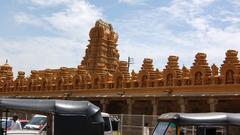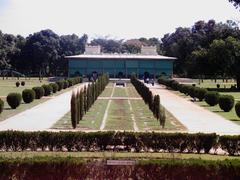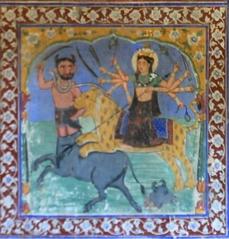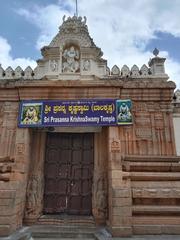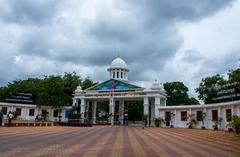
C V Rangacharlu Memorial Hall: Visiting Hours, Tickets, and Complete Guide to Mysore’s Historic Town Hall
Date: 04/07/2025
Introduction
The C V Rangacharlu Memorial Hall, widely known as the Mysore Town Hall, is a distinguished heritage landmark situated in the heart of Mysore, India. Built in 1884 to honor Sir Chetpat Venkatraman Rangacharlu—the first Dewan of Mysore after the restoration of the Wodeyar dynasty—the hall embodies the city’s civic pride, administrative history, and architectural splendor. Today, the hall remains an active venue for cultural events, public meetings, and community gatherings, making it an essential stop for history enthusiasts and visitors exploring Mysore’s vibrant past. This comprehensive guide covers everything you need to know about the C V Rangacharlu Memorial Hall, including visiting hours, ticketing, accessibility, major events, and nearby attractions.
For the latest updates and detailed insights, consult official resources such as the Mysore City Corporation, Karnataka Tourism Official Site, and the Department of Archaeology, Museums and Heritage, Karnataka.
Table of Contents
- Introduction
- Historical Background
- Architectural Highlights
- Role in Mysore’s Civic and Cultural Life
- Visiting the Memorial Hall
- Nearby Attractions
- Preservation and Heritage Status
- Frequently Asked Questions (FAQs)
- Conclusion and Visitor Resources
- Sources
Historical Background
The Legacy of Sir C V Rangacharlu
Sir C V Rangacharlu (1831–1883) was a visionary administrator instrumental in the political and economic revival of Mysore following the British-imposed Commission rule. Appointed Dewan in 1881, his brief but impactful tenure saw major reforms in revenue administration, municipal governance, and education. Rangacharlu spearheaded the formation of the Mysore Representative Assembly, laying the foundation for participatory governance in the princely state (Star of Mysore, The Hindu). His contributions are commemorated in the very existence of the Memorial Hall.
Origins and Construction
The decision to construct the Memorial Hall was made soon after Rangacharlu’s untimely death in 1883. The foundation stone was laid by Maharaja Chamarajendra Wadiyar X, and the building was completed in 1884 under Dewan K. Seshadri Iyer’s supervision (Mysore City Corporation, Karnataka Tourism). The hall was intended to serve as a civic space for public discourse, municipal meetings, and cultural gatherings, symbolizing Mysore’s progressive approach to governance.
Architectural Highlights
The C V Rangacharlu Memorial Hall is an outstanding example of colonial-era architecture in southern India. It features:
- Neoclassical Design: The building’s symmetrical façade, grand portico, and imposing Corinthian columns reflect Neoclassical influences, signifying stability and civic order (Wikipedia, Deccan Herald).
- Indo-Saracenic Elements: Sculptures of Goddess Lakshmi flanked by elephants, and intricate ornamental details, blend Indian motifs with Western styles.
- Grand Interiors: The hall boasts a spacious central auditorium with high ceilings and wooden paneling, suitable for large gatherings, performances, and public events.
- Local Materials: The structure was built using locally sourced stone and crafted by skilled Mysore artisans, ensuring both durability and aesthetic value.
These architectural features position the Memorial Hall as both a civic landmark and an enduring symbol of Mysore’s cosmopolitan heritage (Touristlink, Everything Explained Today).
Role in Mysore’s Civic and Cultural Life
Since its inception, the Memorial Hall has been the epicenter of Mysore’s civic activities—hosting municipal meetings, legislative assemblies, and forums that shaped urban policy (Karnataka Gazetteer). It has also served as a vibrant venue for cultural performances, art exhibitions, literary festivals, and community celebrations—most notably during the annual Dasara festivities (Star of Mysore).
The hall’s proximity to Mysore Palace, Devaraja Market, and other heritage sites makes it a pivotal part of the city’s historical circuit.
Visiting the Memorial Hall
Visiting Hours and Ticket Information
- Open: 9:00 AM to 6:00 PM daily. Hours may be extended during special events or festivals.
- Entry Fee: Free for most public events and general visits. Some performances or guided tours may require tickets, which can be purchased at the venue or online via the Mysore City Corporation.
- Interior Access: The main auditorium is accessible during public events; otherwise, exterior viewing is always permitted (Trek Zone, Wanderlog).
Accessibility and Facilities
- Wheelchair Access: The hall is equipped with ramps and accessible restrooms.
- Seating: Designated areas are available for differently-abled visitors.
- Travel: Easily accessible by taxi, auto-rickshaw, and city buses. Ample parking is available nearby.
Guided Tours and Special Events
- Heritage Walks: Guided tours are occasionally organized, especially during festivals or cultural weeks. Contact local tourism offices for schedules.
- Cultural Events: The hall hosts music, dance, and theater performances, particularly during Dasara and other celebrations (Touristlink).
Tips for Visitors
- Best Time to Visit: October to March (pleasant weather). Dasara season offers the richest cultural experience.
- Photography: Allowed for the exterior; interior/event photography requires permission.
- Etiquette: Respect the heritage structure; avoid touching ornamental elements.
Nearby Attractions
The Memorial Hall is centrally located, within walking distance to key Mysore attractions:
- Mysore Palace: An iconic Indo-Saracenic marvel just minutes away.
- Devaraja Market: Traditional market offering a slice of local life.
- Jaganmohan Palace: Home to an impressive art gallery.
- St. Philomena’s Church: Noted for its neo-gothic architecture.
- Mysore Zoo: One of India’s oldest zoos.
- Railway Museum: Featuring vintage locomotives (Trek Zone).
Preservation and Heritage Status
Recognized as a protected heritage site by the Mysore City Corporation and the Department of Archaeology, Museums and Heritage, the hall has undergone several restoration projects to maintain its structural and aesthetic integrity (Karnataka Heritage, Deccan Herald). Conservation efforts focus on:
- Structural repairs and façade restoration
- Upgrading seating, lighting, and accessibility features
- Ensuring adaptive reuse for civic and cultural functions
These initiatives safeguard the hall’s legacy for future generations.
Frequently Asked Questions (FAQs)
Q: What are the visiting hours of C V Rangacharlu Memorial Hall?
A: The hall is open daily from 9:00 AM to 6:00 PM. Special events may have extended hours.
Q: Is there an entry fee?
A: Entry is generally free; tickets are required for certain events or guided tours.
Q: Is the hall accessible for differently-abled visitors?
A: Yes, the hall has ramps, accessible restrooms, and designated seating.
Q: Are guided tours available?
A: Yes, especially during cultural festivals and by prior arrangement.
Q: Can I take photographs?
A: Exterior photography is permitted; interior/event photography requires permission.
Conclusion and Visitor Resources
The C V Rangacharlu Memorial Hall stands as a testament to Mysore’s dedication to civic progress, heritage conservation, and cultural vibrancy. Its blend of Neoclassical architecture and Indian symbolism, coupled with its ongoing role as a center for community engagement, makes it a must-visit for anyone exploring Mysore’s historical landscape.
For further updates, event schedules, and travel tips, visit the Mysore City Corporation and Karnataka Tourism. Download the Audiala app for curated heritage walks and cultural event alerts. Share your experiences on social media and help preserve Mysore’s unique history for future generations.
Sources and Further Reading
- Mysore City Corporation
- Karnataka Tourism Official Site
- Department of Archaeology, Museums and Heritage, Karnataka
- Deccan Herald
- Star of Mysore
- The Hindu
- Everything Explained Today
- Wikipedia
- Touristlink
- Trek Zone
- Wanderlog
Suggested Visuals:
- High-resolution images of the hall’s façade and architectural details (alt text: “C V Rangacharlu Memorial Hall neoclassical façade with Corinthian columns in Mysore”)
- Photos of interior events and performances (alt text: “C V Rangacharlu Memorial Hall cultural event interior”)
- Map showing the hall’s location relative to Mysore Palace and nearby attractions
Internal Links Suggestions:
- Articles on Mysore Palace, Jaganmohan Palace, Mysore Dasara Festival, and Mysore travel guides

